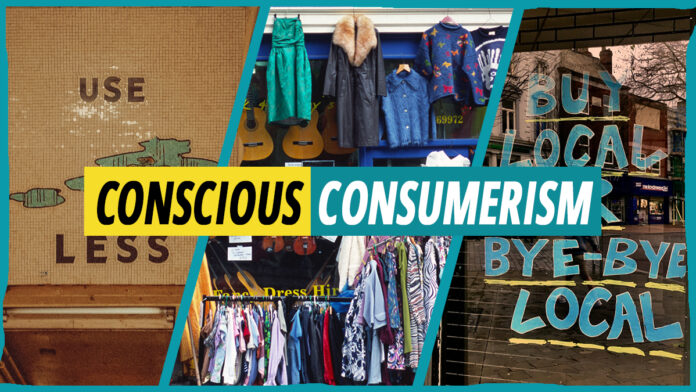In today’s world, where consumption is rampant and its consequences are increasingly evident, the concept of conscious consumerism has gained significant traction. But what exactly does it mean to be a conscious consumer, and why does it matter? Let’s delve into the essence of conscious consumerism and explore how it can shape a more sustainable and ethical future.
Conscious consumerism goes beyond simply purchasing goods and services; it involves making informed and deliberate choices that consider the environmental, social, and ethical implications of consumption. At its core, conscious consumerism is about aligning our values and beliefs with our purchasing decisions to create positive change in the world.
Understanding Conscious Consumerism
Conscious consumerism entails being mindful of the products we buy, the companies we support, and the impact our consumption has on the planet and society. It involves questioning the status quo and seeking alternatives that promote sustainability, fairness, and justice.
Benefits of Conscious Consumerism
Embracing conscious consumerism offers a myriad of benefits, both for individuals and the planet at large.
Environmental Impact
By opting for eco-friendly and sustainable products, conscious consumers can reduce their carbon footprint, minimize waste generation, and protect natural resources, thereby contributing to environmental conservation efforts.
Social Responsibility
Conscious consumerism prioritizes ethical labour practices, fair wages, and humane working conditions, supporting companies that uphold social responsibility and contribute positively to local communities.
Personal Well-being
Making mindful purchasing decisions can enhance personal well-being by fostering a sense of fulfilment, purpose, and alignment with one’s values. Conscious consumers often report greater satisfaction and happiness derived from knowing that their choices make a difference.
Challenges and Obstacles
Despite its benefits, conscious consumerism faces several challenges and obstacles that hinder widespread adoption.
Accessibility and Affordability
Ethical and sustainable products are often perceived as more expensive and less accessible, making it challenging for consumers, particularly those with limited financial means, to prioritize conscious consumption.
Greenwashing
Some companies engage in greenwashing—misleading marketing tactics that exaggerate or fabricate environmental claims—to appeal to conscious consumers without making substantive changes to their practices.
Consumer Habits and Societal Norms
Consumer habits and societal norms, shaped by decades of consumer culture and advertising, can be difficult to break. Overcoming ingrained patterns of consumption requires concerted effort and education.
Practical Tips for Conscious Consumerism
Despite these challenges, there are practical steps that individuals can take to embrace conscious consumerism in their daily lives.
Research and Educate Yourself
Take the time to research products, brands, and companies to understand their environmental and social practices. Look for certifications and labels that indicate ethical and sustainable sourcing.
Support Ethical and Sustainable Brands
Choose to support companies that demonstrate a commitment to ethical labour practices, environmental stewardship, and transparency. Vote with your wallet by patronizing businesses that align with your values.
Reduce, Reuse, Recycle
Adopt a “less is more” mentality by reducing consumption, reusing items whenever possible, and recycling materials to minimize waste generation and promote resource conservation.
Examples of Conscious Consumer Practices
Conscious consumerism encompasses a wide range of practices and behaviours across various industries and sectors.
Sustainable Fashion
Opt for clothing made from organic, recycled, or ethically sourced materials. Support brands that prioritize fair labour practices, pay living wages and prioritize sustainable production methods.
Eco-friendly Household Products
Choose household products, such as cleaning supplies and personal care items, that are biodegradable, non-toxic, and cruelty-free. Look for eco-friendly alternatives to single-use plastics and disposable items.
Ethical Food Choices
Support local farmers markets, organic food co-ops, and ethical food producers. Choose sustainably sourced, plant-based, and organic foods whenever possible, and minimize food waste by practising mindful consumption.
The Power of Collective Action
While individual actions are important, the power of collective action cannot be understated.
Consumer Activism and Advocacy
Get involved in consumer activism and advocacy campaigns that promote transparency, accountability, and positive change within industries. Join forces with like-minded individuals and organizations to amplify your impact.
Community Initiatives and Movements
Participate in community initiatives, such as community-supported agriculture (CSA) programs, zero-waste initiatives, and neighbourhood cooperatives, that promote sustainable living practices and foster a sense of shared responsibility.
Conclusion
Conscious consumerism offers a pathway to a more sustainable, equitable, and compassionate world. By making mindful purchasing decisions, supporting ethical and sustainable brands, and advocating for positive change, individuals can play a vital role in shaping a future where people and the planet thrive in harmony.




